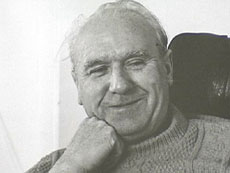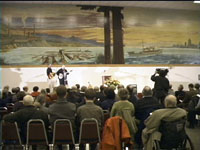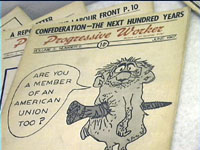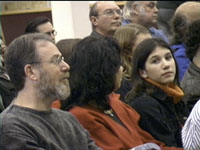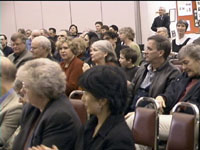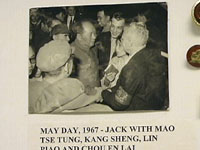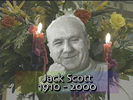Jack Scott Memorial
May 12 1910 -
December 30 2000
first broadcast Friday January 19, 2001 on Shaw TV - Cable 4
working TV # 208, RT: 27:30
working TV webcast, 19/01/01, RT: 67 minutes approx in 3 parts
This week we broadcast a full length program with highlights from the Memorial service for Jack Scott, taped Sunday January 14 at the Maritime Labour Centre in Vancouver. He died December 30 of a heart attack in Vancouver.
For 70 of his 90 years he was a socialist and labour activist. Scott was in the Communist Party for decades until he was expelled in the 1960s. He was ahead of his time in urging Canadian control of Canadian unions.
In his later years, he became an inspiration and mentor for the generations of activists that followed him, including many who are in the leadership of B.C.'s labour movement today.
Perhaps, in a better world, Jack Scott would have been made an officer of the Order of Canada and would have had a state funeral with all sorts of official pomp and ceremony to honour his achievements.
Instead, he was remembered by many friends and comrades from around the globe, who sent messages or who came out to the informal memorial event in a union hall in East Vancouver.
We think Jack would have preferred it this way.
Jack Scott Memorial
webcast in Real Video
Jack Scott Memorial, Part 1
Jack Scott Memorial, Part 2
Jack Scott Memorial, Part 3
Webcasts @ low kps due to length of segments. [email protected]
Web Server courtesy of Community Credit Union,
New Westminster, B.C
from the Globe and Mail, Friday, January 12, 2001 'The most radical man in Canada'
Activist's ideology was forged during the desperate days of the Depression
ROB MICKLEBURGH VANCOUVER -- Jack Scott, once described in a mainstream national magazine as the most radical man in Canada, has died of a heart attack at 90.His death cuts off a remarkable 70-year involvement in socialist activism in Canada that began with a 1930 May Day rally in Montreal and ended with Mr. Scott just two chapters short of completing his fifth book, a critique of the early days of the Russian Revolution.
Along the way, Mr. Scott founded the Canada-China Friendship Association, advocating closer relations between Canada and Communist China during the depths of the Cold War, met legendary Chinese revolutionary leader Mao Tsetung, and was awarded the Croix de Guerre by General Charles de Gaulle for gallantry under fire during the Allies' Normandy landings of 1944.
But Mr. Scott achieved his greatest prominence amid the turbulent West Coast politics of the 1960s and '70s, when he became an inspiration and mentor for many serious young Marxist-Leninists who found the old-style leftism of the Canadian Communist Party too conservative and too wedded to the Soviet Union.
Groups spearheaded by Mr. Scott supported the fierce Maoism of the People's Republic of China and the formation of independent Canadian trade unions free of control from U.S.-based unions.
Advocating these positions led to Mr. Scott's expulsion from the Communist Party and led him to form the Progressive Workers Movement in the early 1960s, calling for revolutionary socialism in Canada.
By the 1970s, however, the PWM had disbanded, and thousands of hard-core socialists across the country were joining intense study groups, belabouring each other over arcane political points and claiming to be in the vanguard of Marxist-Leninist revolution.
Mr. Scott took a leading role in the Vancouver Study Group and Red Star Collective during this time. But unlike the bitterness that often accompanied the inevitable collapse of other study groups, most participants in Mr. Scott's groups remained close to him long after they left their hard-core politics behind and got on with their lives.
"The groups lasted until the babies started coming," laughed former study group member Janet Hall, now working for the Canadian Auto Workers in Vancouver. "The whole radical left was dying out at the time."
Mr. Scott spent his last 20 years writing books on early labour history, working at the left-wing Spartacus bookstore, continuing to closely scrutinize and analyze political events and maintaining an active social life with his former comrades.
"I've heard from so many people touched by his death," said Ms. Hall. "We all remember the knowledge and memory and analytical ability he had. He was never power hungry. He came from such humble roots and worked really hard all his life."
Indeed, Mr. Scott's demise is another loss for the dwindling group of surviving veterans who took part in the highly charged political and organizing struggles of the desperate 1930s in Canada, when tens of thousands of working-class protesters would turn out on a day's notice, and pitched battles with authorities were commonplace. Few are now left to tell those stories.
Mr. Scott left his poverty-stricken roots in Belfast to come to Canada in 1927 at the age of 17. He found work as an indentured farm labourer and construction worker before being thrown out of work and riding the rails during the Depression.
His left-wing radicalism was forged in the fight for unemployment insurance and relief for the hungry. Mr. Scott helped organize the high-profile Ontario Hunger March that drew thousands of unemployed workers on a march from Windsor, Ont., to Toronto in 1934. He was also involved in the historic but ill-fated On to Ottawa trek broken up by the RCMP in Regina in 1935.
After the war, Mr. Scott worked as a Communist trade-union organizer in mines and factories from Yellowknife to Trail, B.C., before ending up in Vancouver, where he became increasingly committed to revolutionary socialism even as he took a respite from political struggle to care for his ailing wife.
Because he never sought elected office in any organization or took high-profile public positions, preferring to organize and agitate at the grassroots level, Mr. Scott was not well known outside radical circles.
But with his distinguished shock of white hair and captivating manner of speaking, Mr. Scott attracted many converts, especially among the young.
Although he had virtually no formal education, he was a voracious reader. And for many idealists pouring out of university, yearning to take on the establishment, Mr. Scott, as both a worker and an intellectual, was an inspiring figure.
"For the university crowd, here was a guy who was working-class but who became very politically learned by dint of self-study and research," said one former activist drawn to Mr. Scott at the time.
"He had personally lived political action, and even though he led a very modest personal life, Jack was charismatic. He was also a kind, thoughtful guy."
The former activist said Mr. Scott was always a strong Canadian nationalist despite the opposition of many leftists in those days who considered nationalism a reactionary concept.
In recent years, the disappearance of a radical left, the introduction of capitalism into Communist China and the sad state of social democracy must have had Mr. Scott shaking his head at the way events have unfolded.
But Ms. Hall said the old Marxist-Leninist never expressed any bitterness.
"He was completely practical. He accepted that the country wasn't ready for revolutionary socialism. He realized it wasn't going to happen, but he continued to write and analyze."
Toward the end, said Ms. Hall, Mr. Scott was becoming more interested in the role of democracy in a one-party system, pointing to his support for student protesters crushed by Chinese authorities in Tiananmen Square in 1989.
Longtime friend Graham Johnson, a university professor who shared Mr. Scott's deep interest in China, said Mr. Scott was feverishly trying to finish his last book before he died. "Like Marx, he basically died at his desk."
Mr. Scott had no children. His wife Hilda died during a visit to China in 1976. She is buried in the country's cemetery for Martyrs of the Revolution.
A memorial service for Mr. Scott will be held on Sunday at the Maritime Labour Centre in Vancouver.
generous support of the
Canadian Union of Public Employees' - BC Division
home | coming up | video online | focus on... | order tapes
about workingTV | contact us | our links
